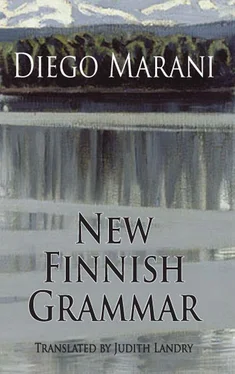But it was many years before I could bring myself to offer these pages to the public (together with the annotations I added at the time), before they vanished, and me with them, once and for all. If there is no denying that it was my error which led the author of this manuscript to his tragic end, may I not at least plead the exceptional nature of the times as some excuse? The extreme uncertainty of those wartime days, when I was surrounded by death and suffering, caused muddled emotion to prevail over lucid reason, despite the fact that reason has so often served me well. At times, fate makes us the instrument of its designs, dragoons us into becoming unwitting accomplices in its savagery. Like this man, I too am an exile. But while he felt affection and gratitude for Finland, I have unfinished business with this country. Throughout all these years, I have tried to suppress my hatred for whoever it was who killed my father. Resisting the siren call of revenge, I have always sought to cherish the memory of the country which, after all, is still my own; I have kept up and cultivated my language, making each word a prayer with which I hoped to seek forgiveness for my father and, for myself, the promise of return.
And all to no avail. Time has sent shards of rancour through the clefts of my being, and it is these foreign bodies which shape my feelings: they take on monstrous form the moment they are born. Everything within me bears their mark, and redemption is no longer possible. My country continues to reject me, to fend me off, accusing me of yet another crime: that of having set the author of these pages on a mistaken course, thus wreaking his destruction.
Upstanding men, men of integrity, may serve as witnesses that what I did I did in all good faith. If Doctor Friedrich Reiner had found the handkerchief with the initials S.K. even a day earlier, the fate of Massimiliano Brodar would have been different, as would my own. One fine June day, when the smell of the sea is borne along the city streets, making every white building a sailing ship, I might have gone back to Helsinki, ready to forgive in order to be forgiven. But perhaps a hostile God had already settled everything, and Massimiliano Brodar is merely an instrument of my damnation.
Doctor Friari’s eyes were the first living thing I saw emerging out of nothingness. Preceded by a rustle of starched cotton, he appeared before me, haloed in blue, and stayed there for a time, watching me carefully. But the shifting blur of my disturbed vision prevented me from making out the outlines of his face. It was as though everything were bathed in a dense liquid, which slowed down movement and deadened sound. What followed were days when nothing seemed to move, whose surface was barely rippled by muffled voices, shadows behind glass, long silences somehow tinged with yellow. I tried to keep my eyes open for as long as possible, to blink away the misty blur so as to see the doctor looking at me. But even the briefest effort was promptly rewarded by a sharp stab which caused me to close my eyes again. I could feel the pain welling up from behind my temples, buzzing and swelling like a swarm of bees before settling behind my eyes. Sometimes a sudden wave of warmth would sweep over me; then I would sweat and feel my head throbbing beneath the bandages. The nurses must have noticed, because suddenly a glass bubble with a drip would appear beside me, and something cold would be applied to my arm. Then gradually the stabbing pains became less frequent, and things around me began to take on greater solidity. The blue halo became a porthole, the long silences were now less tinged with yellow, and the darkness was lit up by a night-light, screwed into a niche in the wall of the corridor.
So, I was on a ship. I could feel its slight pitching, though I could detect no sense of movement. I was aware that all was not well with me, but I saw and felt in a detached way, as though only a part of me were alive and sentient, and floating in something that was alien to me. As I recalled much later, in those days of gradual reawakening my brain was indifferent to my bodily state, as though it no longer had either the will or strength to bother with it. Now, before the doctor’s visits, two nurses would come to seat me in an armchair by the porthole. I had noted that they were Red Cross Nurses, and even in my confusion I remembered that there was a war on. I also thought that I might be a survivor of some wartime operation. But I could not remember who I was, nor did I have the curiosity to do so. My thoughts seemed to well up out of nothingness and then sink down again into the porous soil of my unfocused consciousness. Later on, I thought back to that sensation almost with regret. For just a few, marvellous days I was untouched by memory, free from recall, released from pain. I was just a bundle of cells, a primitive organism like those which peopled the earth millions of years ago. From my chair I could see the other side of the cabin, my camp bed, the bedside table. And above all, even if it was an effort to turn my head, I could see the sea beyond the porthole. Making it to the chair must have been a great step forward, because now Doctor Friari would smile when he came to visit me. He would shine a light into my eyes and examine them, easing them open with his fingers. He would bring down the little folding table fixed to the wall, lay out coloured cardboard shapes on it and ask me to say what they reminded me of. He always seemed very pleased with my reactions, and would jot things down in a notebook.
At first, our meetings took place in silence, taking the form of a dance of movements, courteous gestures and affable nods. After a few days, Doctor Friari began to talk to me, but using words that were different from those he addressed to the nurses — ones with rounder, more full-bodied, lingering sounds. I was as yet unaware of the tragedy that had befallen me, I did not know that the trauma of which I was the victim had debarred me from the world of language. My mind was a ship whose moorings had been shattered by a storm. I could see the landing stage bobbing not far off, and I thought that as I regained my strength I would be able to reach it. What I did not know was that the wind of desperation would carry me ever further out to sea. I could not understand the words that Doctor Friari spoke, nor did I feel any instinct or desire to answer him. But this did not worry me. Without really thinking, I put all this down to the wound I had sustained, to the immense tiredness from which I was gradually recovering. Furthermore, though only in the vaguest possible way, the hazy notion of a foreign language was surfacing in my mind, and this, as far as I could see, would explain why I failed to understand the doctor’s words.
As I learned later, right from those early days, the doctor was speaking to me in Finnish, his own language, which he believed also to be my own. He hoped that the soft, welcoming words of my mother tongue would soothe my pain and lessen my bewilderment, making me feel that I was among friends. I did not try to talk because I simply did not feel the need. All linguistic feeling, all interest in words, had died away. I could not speak any language, I no longer knew which was my own. But I was unaware of this: a subtle veil, like a form of hypnosis, was shielding me from the violent colours of reality.
One morning Doctor Friari opened up a map of Europe on the table and gestured to me to do something I could not understand. I thought that this was some new exercise and set myself to observing the green and brown patches, the jagged indentations of the blue sea, the deep furrows of the rivers. I knew that this was a map, the shapes of the countries meant something to me, I had already seen them on countless occasions. I had a clear idea of the things that I was seeing, but my understanding seemed trapped just below the outer skin of reality. I recognized those outlines just as I did every other object around me, but I could not put a name to them. My mind jibbed at any effort in that direction; as I noted later, it was as though it no longer had the tools to do so. My body, my hands had begun to move again. The movement of my joints gave me the sensation of having a body. I would lay hands on everything I saw: by touching things I would regain some knowledge of them. But my mind no longer knew how to link words and things; detached from me yet alive within me, it moved around without my being able to catch up with it, like a fish in a tank apparently expanded by the water and the glass, so that the edges too seem far away even when they are near. So I no longer knew what I was supposed to do with that map.
Читать дальше












